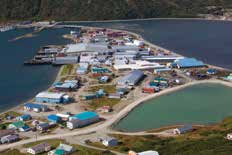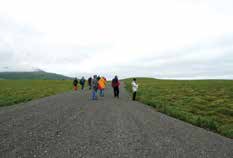Strong support for Izembek land exchange
A packed standing-room only public hearing in Anchorage produced compelling testimony strongly urging the U.S. Fish and Wildlife Service to approve a proposed land exchange that would allow for a long-sought one-lane gravel road between King Cove and Cold Bay.
By nearly a 3-1 ratio, Alaskans supported the exchange between the federal government, the State of Alaska, and the King Cove Corporation.
The Izembek National Wildlife Refuge Land Exchange would provide for a safe, reliable, and affordable land transportation link for King Cove residents to an all-weather airport at Cold Bay. Most residents in the region, including their local governments, strongly support the 19-mile road, which would be narrow and unobtrusive.
The road would be used primarily for health and safety purposes and would be closed to commercial traffic. The road corridor was evaluated in a recent environmental impact statement and its routing was chosen to minimize adverse impacts to refuge resources and the transfer of federal acreage. The route was also chosen to incorporate existing roads and trails into the corridor.
The land exchange would involve the removal of only 131 acres of federallydesignated Wilderness inside the Izembek refuge and 1,600 acres of federal land within the Alaska Maritime National Wildlife Refuge. The federal government would receive 43,000 acres of land owned by the State and approximately 13,000 acres of land owned by the King Cove Corporation. Overall, the exchange would add more than 56,000 acres to the Izembek and Alaska Peninsula National Wildlife Refuges and designate 43,000 acres as federal Wilderness.
The road would solve King Cove’s perennial problem with access to the outside world, especially in poor weather conditions, which is common in the area. A marine link between the two communities has not solved King Cove’s transportation challenges in reaching Cold Bay and its airport in poor weather. A hovercraft was put in operation in the last decade, but that option proved more expensive and difficult to keep in service. Weather conditions often inhibited the hovercraft and the service was eventually cancelled. Meanwhile, air transportation is limited by weather, availability of aircraft, and the topographic constraints of the King Cove airport. Flights are often delayed or cancelled.
At the Anchorage hearing, local residents spoke of family members who perished in plane crashes while attempting to fly out of King Cove in poor weather, and others with medical emergencies who died after being stranded after flights were grounded by the weather.
On average, one to two patients a year die at the King Cove Clinic due to transfer delays. “We have lost children and adults,” said Dr. Martha Cotton. “We have had pregnancy disasters and major trauma. Imagine what it’s like knowing the weather is bad and you have a critically ill child who you know will have problems surviving without the benefit of hospital or a surgery.”
A certified family medicine physician, Elizabeth Clawson called the road a “complete medical necessity” and warned that the King Cove clinic is not equipped to handle any continuing care of lengthy treatment of any patient, nor are the providers. “Should patients be denied medical care because some political agenda will not allow a road from King Cove to the much bigger, more accessible Cold Bay airport? Is anything worth that?”
Orin Seybert, the founder of PenAir, warned that the King Cove airport is the most dangerous in Alaska and noted the proposed 19-mile road would provide a simple solution and save lives.
Although there is no industry interest that will benefit from the road, RDC has been a consistent advocate for the road and offered supportive testimony. “The spirit of the proposed land exchange would recognize and honor with equal regard the human side of conservation, alongside wildlife and wilderness,” RDC said. “King Cove Corporation is giving up 20 percent of its land for a single-lane gravel road. That demonstrates how much of a priority emergency access to the airport at Cold Bay is to local residents. King Cove has been waiting 20 years to build a surface transportation link to Cold Bay and the land exchange is a big step in the right direction.”
National environmental groups testified in opposition to the road, citing wilderness values and waterfowl resources. Local residents said the road would have little, if any, impact.



The gravel road connecting King Cove (top) and Cold Bay would be built to the same standard as the new 17-mile gravel road on King Cove Corporation land (middle) from the King Cove airport to the hovercraft terminal. Pictured above is an existing motorized trail in the Izembek Wilderness legally used by local residents to access subsistence resources. The road would utilize existing trails to minimize its footprint.
Return to newsletter headlines